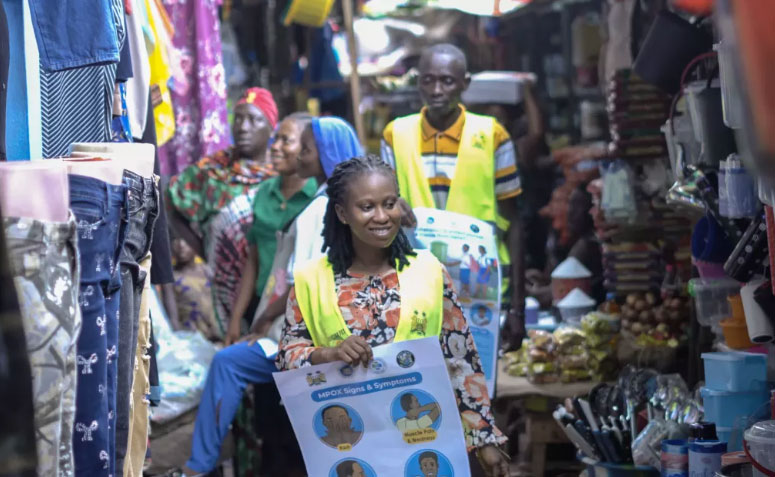Through radio jingles, posters, daily text messages and door-to-door visits, Sierra Leone’s public health officials are driving a messaging campaign aimed at preventing the spread of mpox. Experts say the effort has contributed to a sharp drop in new cases since they spiked in May.
The campaign and other public health measures helped bring new cases down from 600 per week in May to about 26 per week as of the end of September, according to the Africa Centres for Disease Control and Prevention. The country’s fatality rate also declined sharply.
“The case fatality rate was the key challenge for Sierra Leone, so we really commend the country for the great job that has been done on that side,” said Yap Boum II, assistant manager of Africa CDC’s incident management team.
Dr. Ngashi Ngongo, head of the Africa CDC’s incident management team, credited Sierra Leone’s sharp drop in mpox cases with intensified community surveillance, good vaccination rates and improved testing.
“This is one of the best stories that we have,” he said during a briefing on mpox outbreaks around the continent. Despite recent case declines, the majority of new infections are in the western part of the country. Sierra Leone’s mpox outbreak began with two cases at the beginning of the year. That grew to 1,400 by May and 4,200 and 28 deaths by late June, according to the World Health Organization (WHO).
Although there’s an mpox vaccine, treatment typically means addressing symptoms while letting the disease run its course. People with compromised immune systems sometimes need special attention. Severe cases can result in blindness or even death.
Sierra Leone is not alone in dealing with rapidly spreading mpox. Burundi, the Democratic Republic of the Congo and Uganda also are experiencing outbreaks.
Sierra Leone’s public messaging has emphasized the way mpox spreads and urges people to wash their hands or use hand sanitizer regularly. The campaign has helped to reduce stigma around the disease as people share their experiences through social media.
Speaking to members of Sierra Leone’s media, Dr. George Ameh, the WHO’s representative in Sierra Leone, emphasized the role public trust plays in bringing the mpox outbreak under control.
“Through your platforms, we can confront rumors, dispel fear, and deliver accurate, life-saving information,” Ameh said.
According to the WHO, media organizations attending Ameh’s meeting committed to offering free airtime for talk shows, radio announcer mentions and jingles to raise awareness.
Alfred Jamiru, Sierra Leone’s deputy minister for local government and community affairs, was part of the program in August aimed at teaching local community leaders how to educate residents about mpox.
A key factor in reducing the spread is to eliminate any sense of shame surrounding the disease for the leaders and their residents, Jamiru told Sierra Network Salone.
“There is no shame,” Jamiru said. “Make them see for themselves the cost of what’s going on, the cost to the human body and, eventually, human lives.”
As of September, Sierra Leone had received 267,000 doses of mpox vaccine, primarily for high-risk patients, people living in close contact with infected persons and front-line health workers. The Africa CDC in August characterized vaccine rates in the country as “good.”
However, United Nations officials recently reported that they have run out of funds to buy more vaccine doses for other countries experiencing mpox outbreaks.
With help from UNICEF, Sierra Leone’s public health workers took their mpox prevention message to market vendors in the community of Bo about 240 kilometers east of the capital, Freetown. Social mobilizer Alice Brima moved from stall to stall delivering a simple message: Mpox is real.
Brima and colleague Hindowa Alie have been training others to get the message out among shoppers and sellers in the country’s crowded markets.
In a WHO statement, Brima said: “We must achieve our objective to create awareness and understanding of the disease among these critical set of stakeholders, the market vendors and buyers, so that collectively, we could curtail its rapid spread.”

